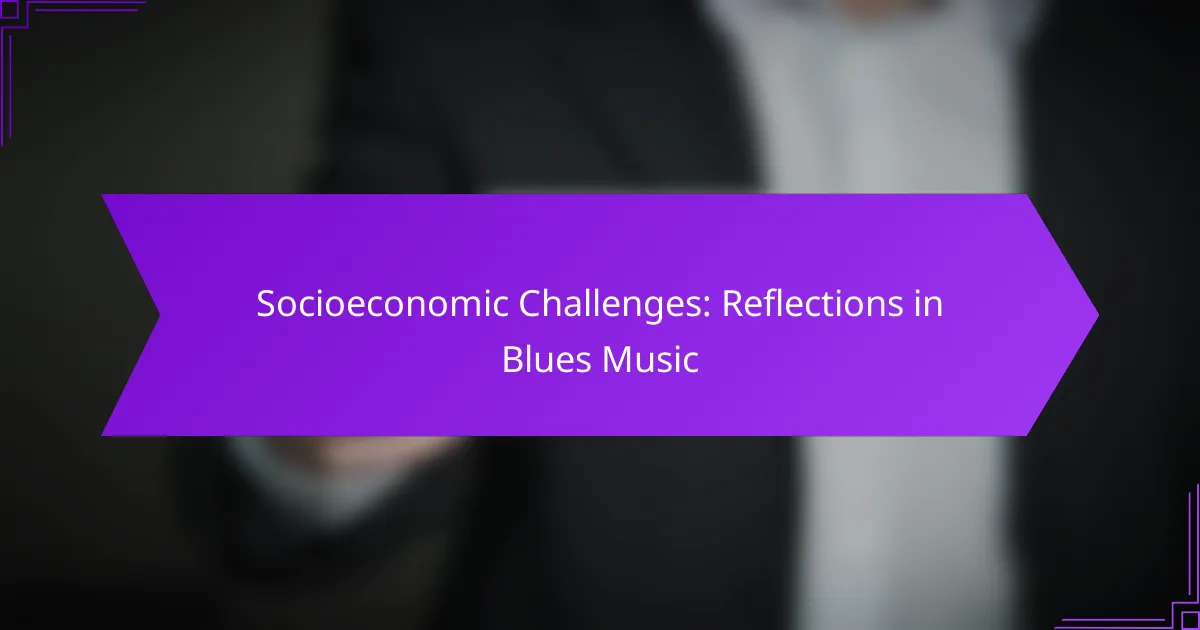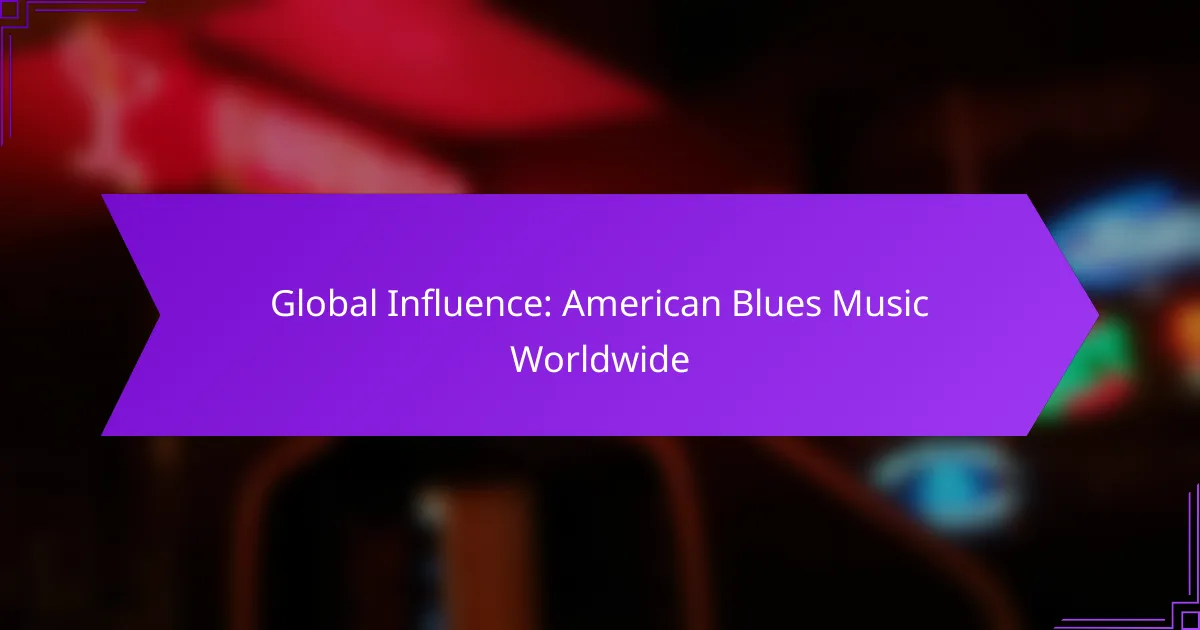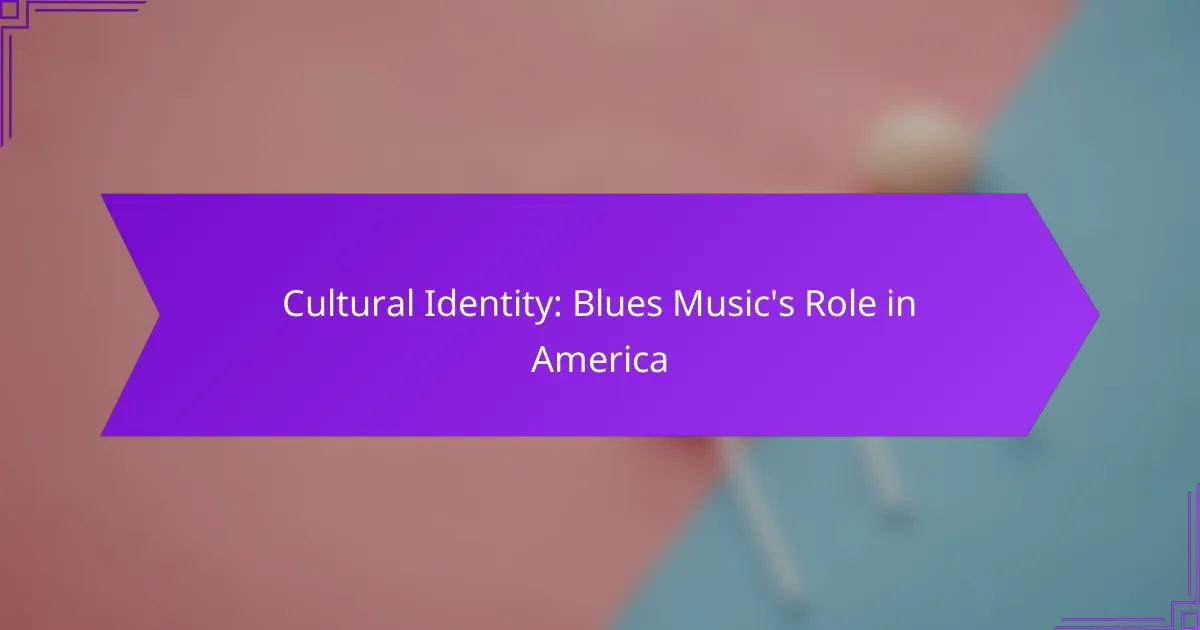Blues music serves as a poignant reflection of socioeconomic challenges in the United States, encapsulating the struggles and resilience of marginalized communities. Through its rich narratives, the genre addresses issues such as poverty, discrimination, and social injustice, making it a powerful vehicle for awareness and social change.
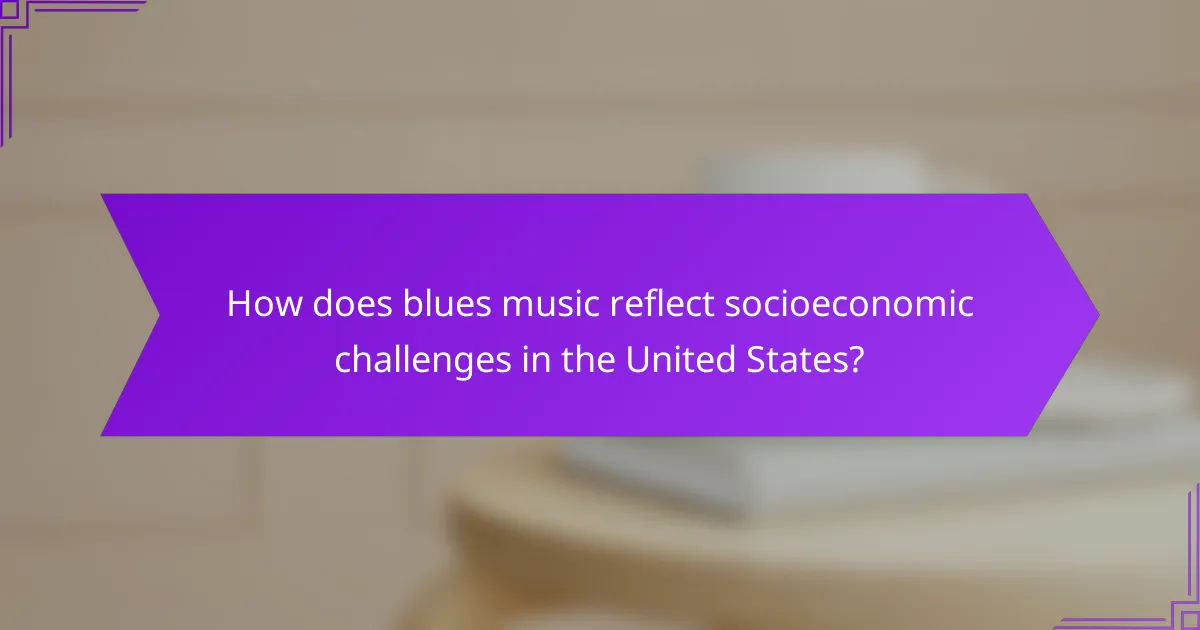
How does blues music reflect socioeconomic challenges in the United States?
Blues music serves as a powerful reflection of socioeconomic challenges in the United States, capturing the struggles and resilience of marginalized communities. Through its themes and narratives, blues articulates the hardships faced by individuals, often stemming from poverty, discrimination, and social injustice.
Historical context of blues music
The origins of blues music can be traced back to the late 19th and early 20th centuries, primarily in the Deep South. It emerged from African American communities, influenced by spirituals, work songs, and folk traditions, often as a response to the harsh realities of life, including slavery and economic hardship.
As blues evolved, it became a means of expressing personal and collective struggles, particularly during the Great Migration when many African Americans moved north in search of better opportunities. This historical backdrop is essential to understanding the genre’s deep connection to socioeconomic issues.
Socioeconomic themes in lyrics
Blues lyrics frequently address themes such as poverty, unemployment, and systemic racism. Artists often recount personal stories of hardship, reflecting the daily struggles of life in economically disadvantaged neighborhoods. For instance, songs may describe the pain of losing a job or the challenges of making ends meet.
Additionally, blues music highlights the emotional toll of these socioeconomic challenges, with artists conveying feelings of despair, resilience, and hope. This blend of storytelling and musical expression allows listeners to connect deeply with the lived experiences of those facing similar issues.
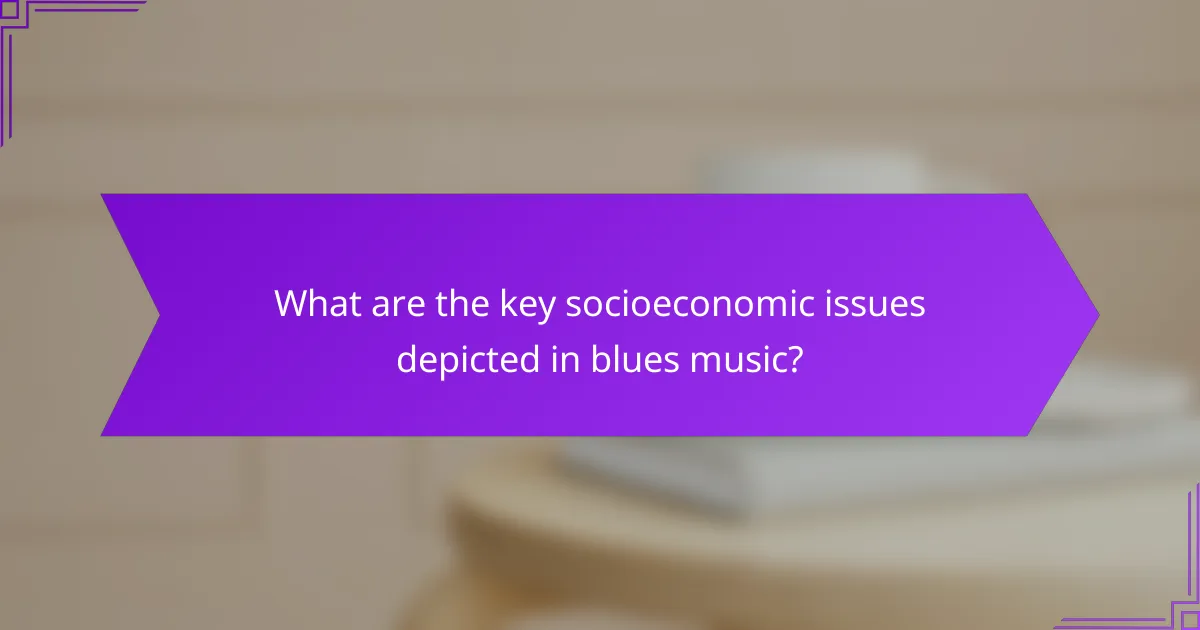
What are the key socioeconomic issues depicted in blues music?
Blues music often reflects significant socioeconomic issues, primarily focusing on poverty, economic hardship, and racial discrimination. These themes resonate deeply within the genre, illustrating the struggles and resilience of marginalized communities.
Poverty and economic hardship
Poverty is a central theme in blues music, capturing the daily struggles of individuals facing financial instability. Many songs narrate experiences of job loss, low wages, and the constant battle to make ends meet, often highlighting the emotional toll of such hardships.
For example, lyrics may describe working long hours for minimal pay or the despair of being unable to afford basic necessities. This portrayal serves as a powerful reminder of the economic realities faced by many, particularly in regions with limited job opportunities.
Racial discrimination and inequality
Racial discrimination and inequality are prominent issues depicted in blues music, reflecting the historical and ongoing struggles of African Americans. Many songs address the injustices faced due to systemic racism, including limited access to education, employment, and fair treatment under the law.
Through poignant storytelling, blues artists convey the pain of discrimination and the fight for equality. This genre not only entertains but also educates listeners about the harsh realities of racial inequality, making it a vital cultural expression of social justice.
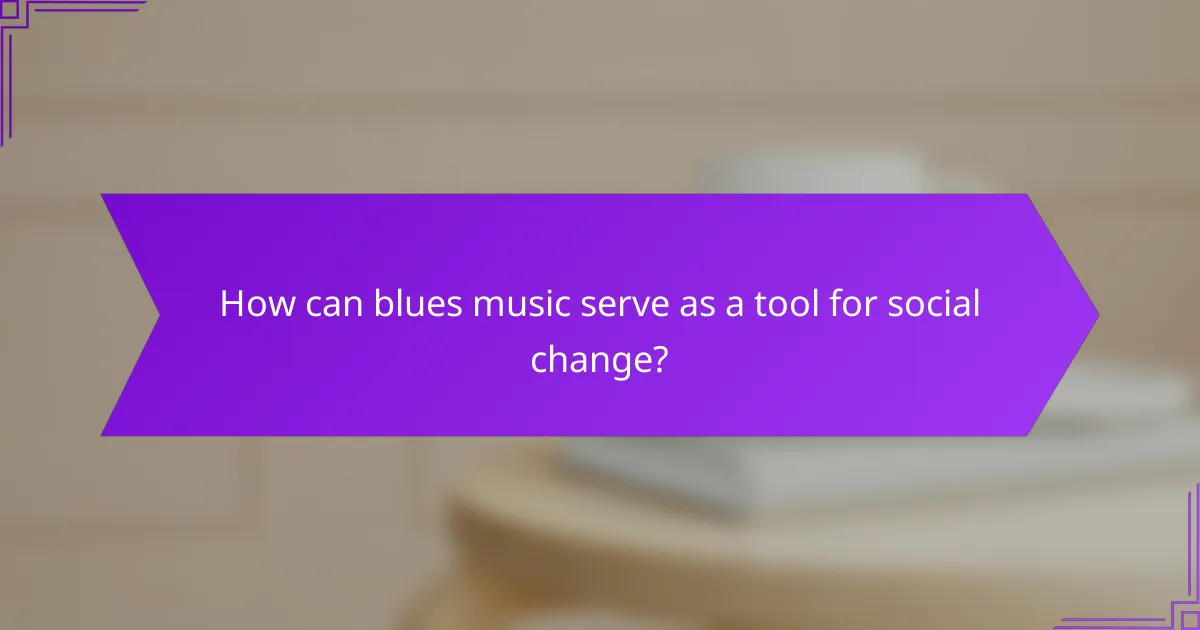
How can blues music serve as a tool for social change?
Blues music can effectively promote social change by raising awareness of socioeconomic issues and fostering community engagement. Through its powerful storytelling and emotional resonance, blues serves as a voice for marginalized communities, highlighting their struggles and aspirations.
Raising awareness through storytelling
Blues music often tells stories that reflect the lived experiences of individuals facing socioeconomic challenges. These narratives can shine a light on issues such as poverty, discrimination, and inequality, making them relatable to a broader audience. For instance, songs that discuss the hardships of working-class life can evoke empathy and inspire listeners to consider the realities faced by others.
By using personal anecdotes and vivid imagery, blues artists can create a strong emotional connection with their audience. This connection not only raises awareness but also encourages listeners to engage with the social issues presented in the music. As a result, blues serves as a powerful medium for social commentary and change.
Community engagement and activism
Blues music can galvanize communities by bringing people together for collective action. Events such as blues festivals or benefit concerts often serve dual purposes: celebrating the genre while raising funds or awareness for social causes. These gatherings foster a sense of unity and shared purpose among attendees, amplifying the message of social change.
Moreover, many blues musicians actively participate in activism, using their platform to advocate for social justice. By collaborating with local organizations or participating in campaigns, they can mobilize their fan base to support important causes. This engagement not only enhances the impact of their music but also empowers communities to take action toward positive change.
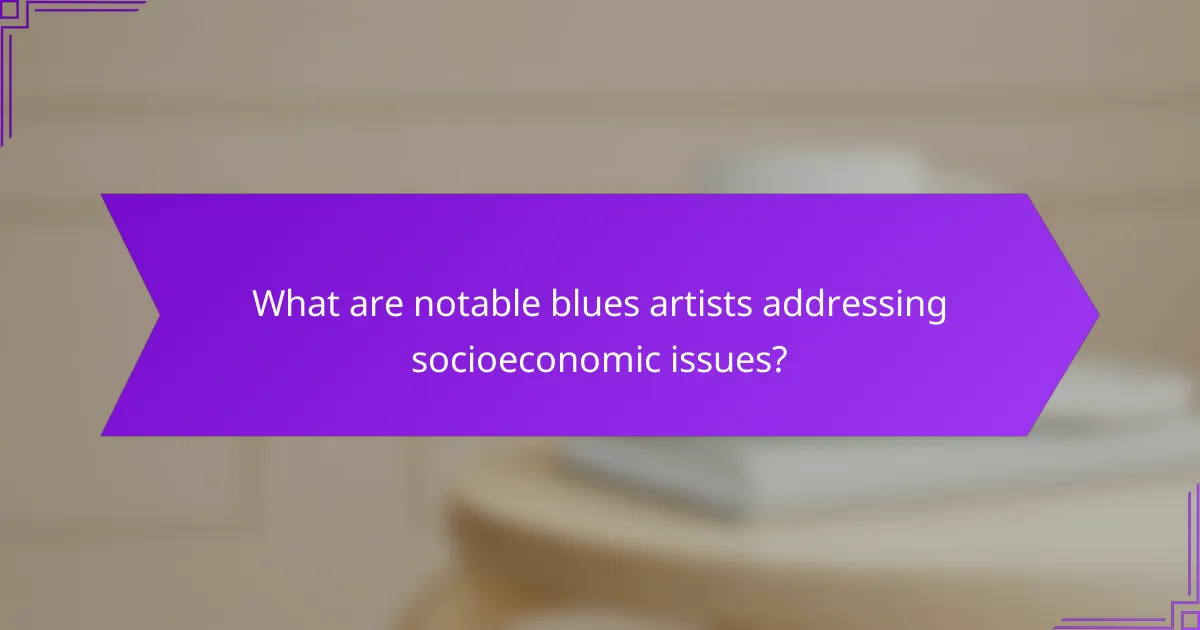
What are notable blues artists addressing socioeconomic issues?
Notable blues artists have long used their music to highlight socioeconomic issues, reflecting the struggles and injustices faced by marginalized communities. Through powerful lyrics and emotive performances, they bring attention to themes such as poverty, racism, and inequality.
B.B. King and his impact
B.B. King, often referred to as the “King of Blues,” addressed socioeconomic challenges through his music, which resonated with audiences worldwide. His songs often depicted the hardships of life, including themes of love lost and the struggles of the working class.
King’s influence extended beyond music; he became a voice for social change, advocating for civil rights and equality. His performances often served as a platform to raise awareness about the socioeconomic issues affecting African Americans, making him a pivotal figure in both music and social justice.
Billie Holiday’s social commentary
Billie Holiday is renowned for her poignant social commentary, particularly in her iconic song “Strange Fruit,” which addresses the horrors of racism and lynching in America. This powerful piece starkly illustrates the brutal realities faced by African Americans, making it a significant work in the blues genre.
Holiday’s ability to convey deep emotion through her music not only highlighted the struggles of her time but also inspired future generations of artists to use their platforms for social change. Her legacy continues to influence discussions around race and inequality in society today.
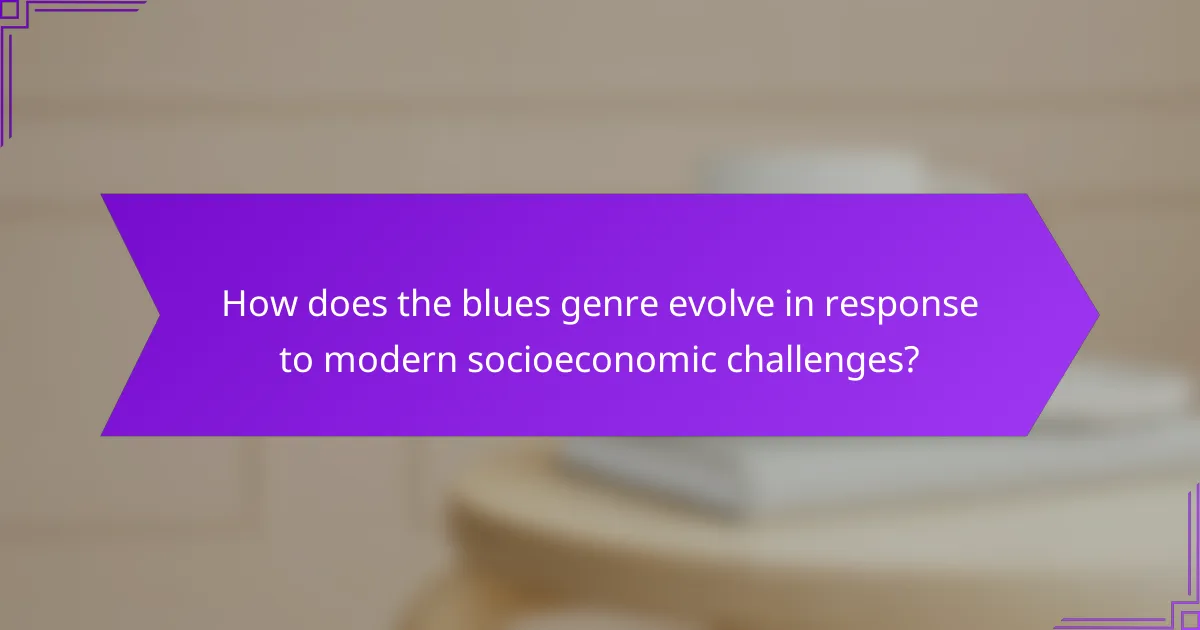
How does the blues genre evolve in response to modern socioeconomic challenges?
The blues genre adapts to modern socioeconomic challenges by incorporating contemporary themes and sounds that reflect current struggles. This evolution is evident in how artists blend traditional blues elements with modern influences to address issues like inequality, economic hardship, and social justice.
Fusion with contemporary genres
Blues music increasingly fuses with genres such as hip-hop, rock, and electronic music, creating a hybrid sound that resonates with younger audiences. This blending allows artists to express contemporary issues through familiar musical frameworks, making the messages more accessible.
For example, artists like Gary Clark Jr. and Alabama Shakes combine blues with rock and soul, using their platforms to discuss themes like racial injustice and economic disparity. This cross-genre collaboration not only revitalizes the blues but also broadens its appeal.
Emerging artists and new narratives
New artists in the blues scene are crafting narratives that reflect their unique experiences and the socioeconomic realities of their communities. These musicians often draw from personal stories, highlighting struggles with poverty, discrimination, and resilience.
For instance, artists like Shemekia Copeland and Joe Bonamassa address issues such as mental health and systemic inequality in their lyrics. By doing so, they not only keep the blues relevant but also encourage listeners to engage with these pressing societal challenges.
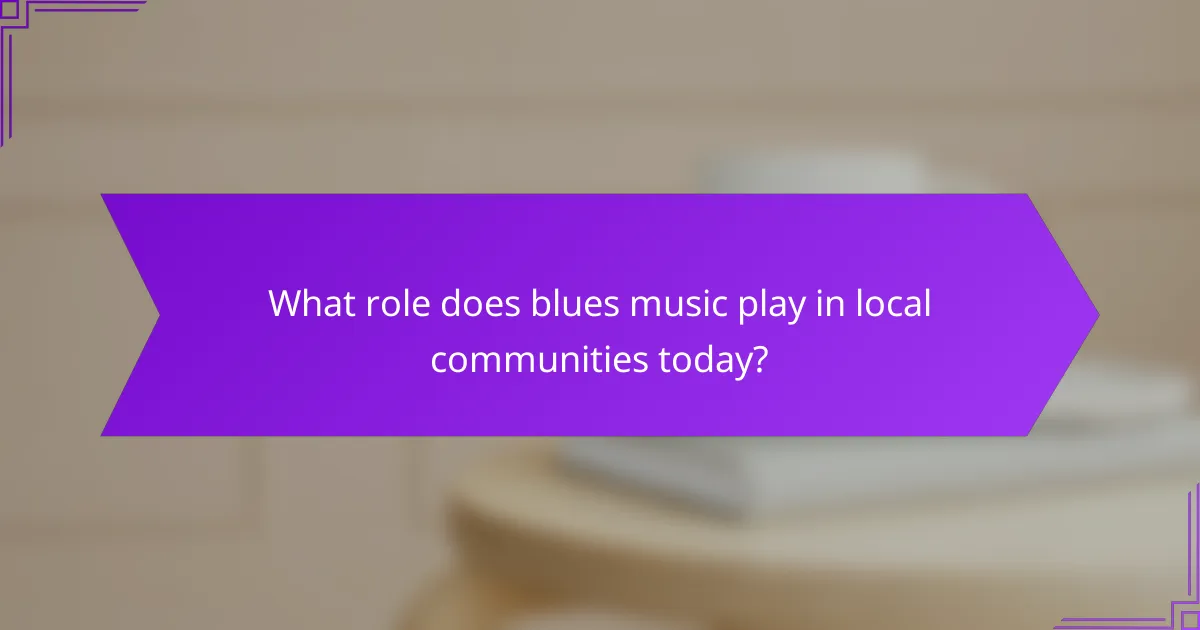
What role does blues music play in local communities today?
Blues music plays a vital role in local communities by fostering cultural identity and providing a platform for social commentary. It serves as a unifying force, bringing people together through shared experiences and emotions related to socioeconomic challenges.
Community events and festivals
Community events and festivals centered around blues music are essential for celebrating local culture and heritage. These gatherings often feature live performances, workshops, and art displays, attracting both residents and tourists. For example, annual blues festivals can draw thousands of attendees, boosting community spirit and engagement.
Such events also provide opportunities for local artists to showcase their talents, creating a vibrant atmosphere that encourages collaboration and networking. Organizers often partner with local businesses, enhancing the overall experience and promoting community cohesion.
Support for local economies
Blues music significantly supports local economies by attracting visitors and generating revenue for businesses. Music venues, restaurants, and hotels benefit from increased foot traffic during blues events, leading to higher sales and job creation. For instance, a successful blues festival can lead to a noticeable uptick in sales for nearby establishments.
Moreover, local musicians often rely on these events for income, which helps sustain the arts within the community. Investing in blues music initiatives can create a ripple effect, fostering economic growth while preserving cultural traditions.
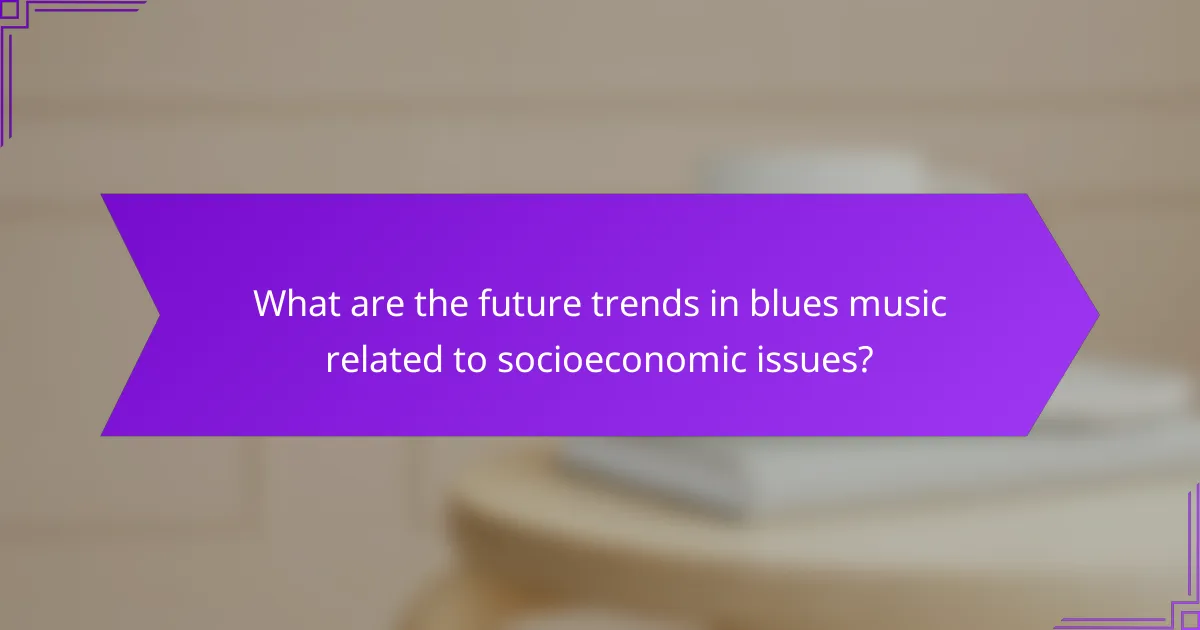
What are the future trends in blues music related to socioeconomic issues?
Future trends in blues music will increasingly reflect socioeconomic challenges, as artists leverage technology and global influences to address these issues. The genre is evolving, with a focus on accessibility and the incorporation of diverse cultural elements that resonate with contemporary audiences.
Digital platforms and accessibility
Digital platforms are transforming how blues music is distributed and consumed, making it more accessible to a global audience. Streaming services like Spotify and Apple Music allow artists to reach listeners without traditional barriers, such as record label contracts or geographic limitations.
However, this shift also presents challenges. Independent artists may struggle with revenue generation, as streaming payouts can be low. To maximize earnings, musicians should consider diversifying their income streams through merchandise sales, live performances, and crowdfunding initiatives.
Global influences on blues music
Global influences are reshaping blues music, as artists from various cultural backgrounds incorporate their unique experiences and sounds. This fusion creates a richer musical landscape, allowing blues to resonate with a wider audience while addressing universal socioeconomic themes.
For example, collaborations between blues musicians and artists from genres like reggae or hip-hop can highlight shared struggles, fostering a sense of community and understanding. Musicians should remain open to these influences, as they can enhance creativity and broaden their appeal in an increasingly interconnected world.
